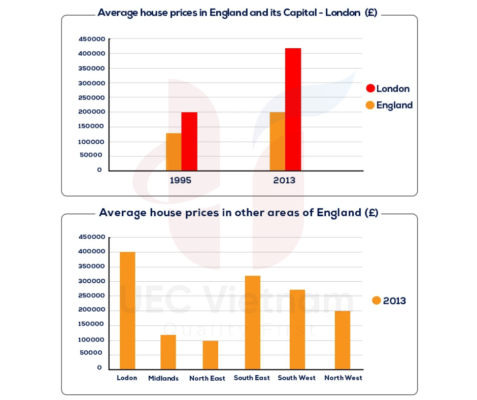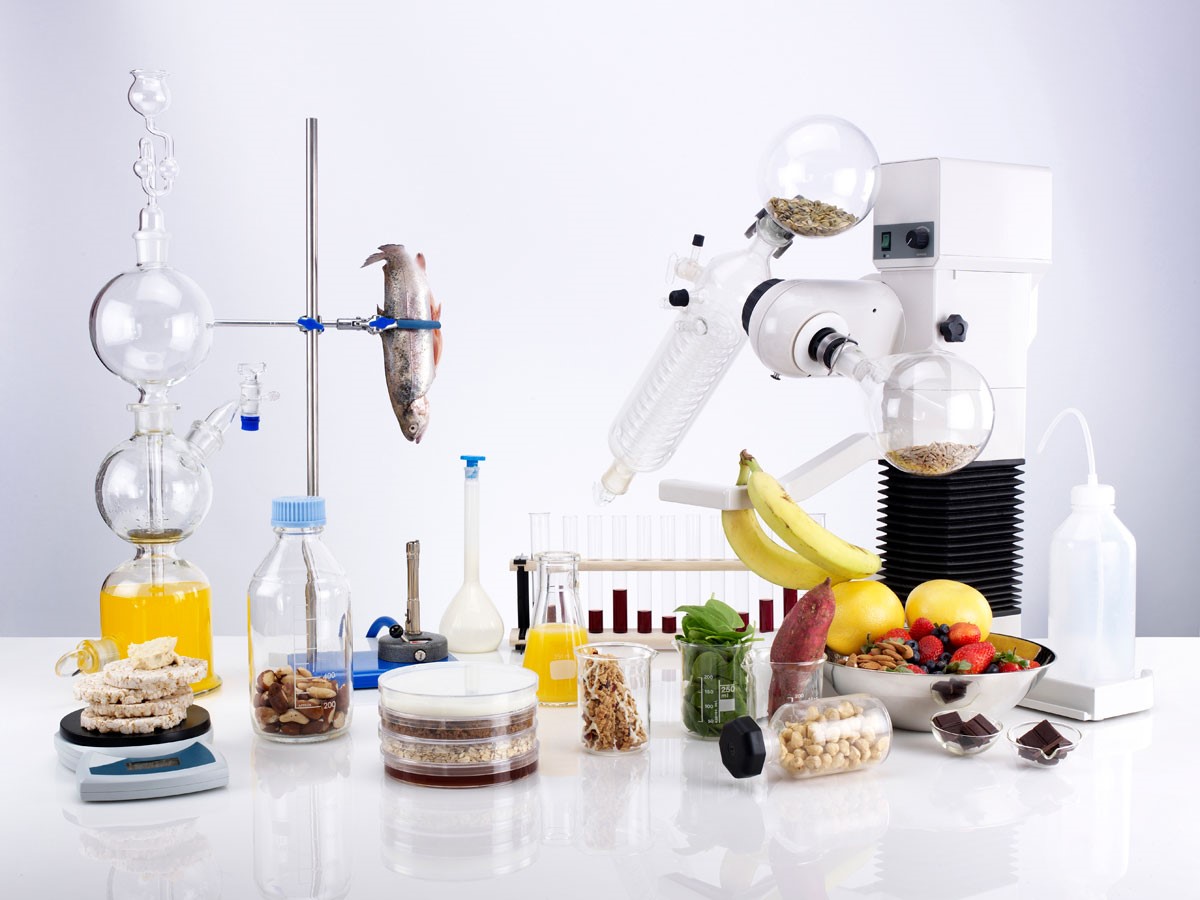Đề bài và Giải đề IELTS Writing ngày 16/01/2021 chi tiết. Các bạn tham khảo bài viết bên dưới và ôn luyện IELTS thật tốt nhé.
Mục lục bài viết
Giải đề IELTS Writing Task 1 ngày 16/01/2021
The bar charts illustrate the average house expenses in England and its capital city – London, and to present the comparison regarding the average house prices between distinct areas of England within the year 2013.

1. Cấu trúc bài viết
– Mở bài: Viết lại câu hỏi theo cách khác.
– Đoạn tổng quan: Phân tích những đặc điểm chính của cả 2 biểu đồ bar chart.
- Bar chart 1: Nhà ở thủ đô London giá luôn cao giá trung bình cả nước.
- Bar chart 2: Nhà ở thủ đô London đắt nhất trong số các vùng được liệt kê, trong khi nhà ở vùng North East lại rẻ nhất.
– Đoạn miêu tả 1: Tả bar chart thứ nhất, so sánh số liệu giữa 2 hạng mục London và England trong cả hai năm được cho.
– Đoạn miêu tả 2: Tả bar chart thứ hai, so sánh số liệu giữa các vùng được liệt kê trong năm 2013.
2. Bài tham khảo
The bar charts illustrate how much an average house costs in England and its capital city – London, as well as comparing the average house prices between different areas of England.
Overall, citizens living in the capital had to pay far more for a house compared to the country average house price. Additionally, a standard house in London cost the most, whereas the least expensive one could be found in the North East.
In 1995, the average price of a house in London was 20,000 £, significantly higher than England’s average price, at around 13,000 £. The difference in house value between the capital and the country became even more remarkable in 2013, when London citizens typically paid higher than 40,000 £ for a house, more than double the country’s average.
In terms of costliness, houses in London stood at the top of the list. Next came South East, South West and North West, with figures at around 31,000 £, 26,000 £ and 20,000 £ respectively. By contrast, the most affordable housing was in the Midlands and North East, with average prices at only around 10,000 £.
Xem thêm:
Giải đề IELTS Writing Task 2 ngày 16/01/2021
Some people think students should study the science of food and how to prepare it. Others think students should spend time on other important subjects. Discuss both views and give your opinion.

1. Phân tích đề
– Dạng câu hỏi:
Đây là dạng thảo luận hai luồng ý kiến trái chiều. Đối với dạng đề này, thí sinh cần phải tìm ra cơ sở hình thành cả hai luồng ý kiến này và đưa ra qua điểm cá nhân về chủ đề đang được bàn đến.
– Yêu cầu đề
Thí sinh cần đưa ra lý do chứng minh cho hai quan điểm khác nhau:
- Tại sao nên thêm môn khoa học thực phẩm và phương pháp chuẩn bị vào trong chương trình học.
- Tại sao học sinh nên dành thời gian cho những môn học quan trọng hơn (như Toán, Văn, Anh)
Sau đó thí sinh đưa ra quan điểm cá nhân về chủ đề này. Cách tốt nhất là chọn ủng hộ một bên ý kiến hơn là bên còn lại.
2. Cấu trúc bài viết
– Introduction: Mở bài giới thiệu chủ đề và đưa ra định hướng bài viết (In this essay, both sides of the argument will bediscussed). Nếu tốt hơn, có thể đưa ra quan điểm ngay mở bài.
– Body 1: Đoạn thân bài thứ nhất bàn luận về những lợi ích của môn khoa học thực phẩm và phương pháp chuẩn bị thức ăn. Việc học môn này sẽ giúp học sinh như thế nào?
– Body 2: Đoạn thân bài thứ hai bàn luận về lí do tại sao học sinh nên dành thời gian chủ yếu cho những môn học chính, thay vì học thêm môn khoa học thực phẩm.
- Những môn học chính có tầm quan trọng như thế nào?
- Tại sao việc học thêm khoa học thực phẩm có thể không phải là cách sử dụng thời gian tốt nhất đối với học sinh?
– Conclusion: Kết bài khẳng định lại quan điểm cá nhân.
3. Bài tham khảo
In today’s time, there is a great deal of suggestions being made to the study program for students and the subjects included therein. While some propose that the science and preparation of food should be added in courses, others insist on giving priority to more important subjects. Personally, I side with the latter view.
On the one hand, there are certain benefits to be gained from the study of food. Firstly, scientific knowledge about food encourages students to take a health-conscious approach to their diet. Because when students understand how food constituents like proteins, fats, carbohydrates, affect their physical condition, they may become more willing to adopt a balanced diet in preference to fast food. Also, food science entails the study of preparation methods that guide students towards food safety. Specifically, students can learn about the proper way of treating food, like dehydrating or freezing, as well as how to preserve and contain them appropriately to prevent bacterial growth. This, in turns, will minimize risks of foodborne illness.
On the other hand, I believe that students’ time should be dedicated to the learning of main subjects. The primary goal of school education should be to prepare students for one pivotal end that is the university entrance exam. This means placing more emphasis on core subjects like Math, Literature and English, which are practical subjects for evaluating students’ performance. Furthermore, it is likely that food science would only be introduced as a side-subject and account for one session in students’ weekly timetable. In other words, student’s engagement will be at a minimum, thereby limiting the subject’s applicability.
In conclusion, despite the several benefits offered by the incorporation of food science into students’ curriculum, I am still of the opinion that students should devote their time mainly to core subjects.
4. Từ vựng
- (be) included therein: bao gồm trong đó
- insist on (doing sth): mặc định phải làm gì đó
- health-conscious: nhận thức, quan tâm về sức khoẻ
- food constituent(s): thành phần trong thức ăn (thường liên quan đến hoá chất)
- proteins, fats, carbohydrates: chất protein, chất béo, hiđrat cacbon (đường)
- in preference to: hơn là, thay vì
- entail: liên quan đến
- foodborne illness: bệnh từ thực phẩm
- be dedicated to s.th: được dành cho việc gì đó
- pivotal end: một mục tiêu then chốt, trọng tâm
- place more emphasis on s.th: đề cao việc/ thứ gì đó
- evaluate one’s performance: đánh giá hiệu suất của ai đó
- session: một tiết, một buổi
- engagement: sự nhập tâm
- applicability: khả năng áp dụng
- devote one’s time mainly to sth: dành thời gian chủ yếu cho việc gì đó
Xem thêm: Tổng hợp đề IELTS Writing 2021 (kèm bài mẫu) | Cập nhật liên tục

